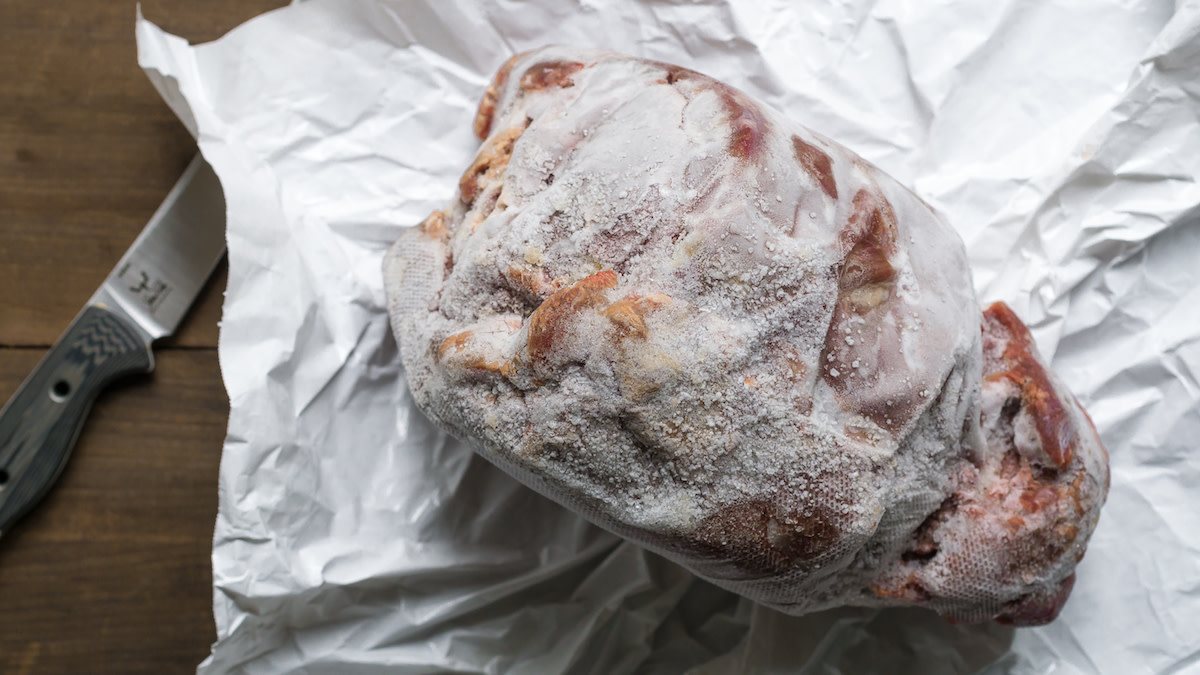How to Salvage Freezer-Burned Meat

Everyone knows what it’s like to pull a hunk of meat out of the freezer, only to find a fibrous, brown layer across it. Freezer burn sucks, but before you toss that meat in the garbage, know that you can often salvage some of it. Here’s how to make use of this meat.
What Causes Freezer Burn?
Whether bones poked a hole in your plastic wrap or your vacuum sealer failed to suck all the air out, the end results are the same. Air seeps in the package and causes freezer burn. Ice crystals form on the meat and oxidize or dry it when they evaporate.
Can You Eat Freezer Burned Meat?
Contrary to what some people believe, freezer-burned meat is safe to eat. However, that doesn’t mean it’s going to taste great. The real damage of freezer burn is that it causes a dry, leathery texture. The flavor will also depreciate, a sign that it’s lost its freshness. And, the grayish-brown color isn’t very appealing.
If you froze something particularly fatty such as sausage, salmon, bear meat, or a duck with the skin on, the fat can oxidize and go rancid over time. This creates a foul smell and taste that is hard to ignore. This reaction can happen regardless of how perfectly packaged your meat is. These cuts expire faster than lean roasts.
Cooking Tips for Freezer-Burned Meat
I’ll admit that eating oxidized meat isn’t always a great experience, but I hate letting anything go to waste. So, I’ve learned a few tricks that can redeem almost any frozen package.
The first thing you should do is defrost the meat slowly in the refrigerator or a bowl of ice water. This rule applies to all frozen meat, but in this case especially. Setting a package on a metal tray will help it defrost faster in the fridge, but you should never submerge it in warm water or use the microwave. Warm water can promote bacterial growth, and a microwave will exacerbate any off odors. With freezer-burned meat, you need all the help you can get, and that starts with defrosting it slowly and correctly.
The damage is usually on the outside of the meat, not penetrating more than a quarter inch or so. If you’re working with a roast, you can trim the outer layers off, similar to how you would trim away silverskin. The same thing goes for ground meat, but you’ll need to do it when it’s partially frozen. You should also trim away the skin or fat off any cut that may be rancid.
If more than just the surface seems to be damaged, then you’ll have to assess how bad it is and try two other methods: brining and heavy seasoning.
Since freezer burn causes meat to dry out, you can counteract it with abrine.Salt can help mitigate moisture loss when cooked, making it one of the most important tools in your pantry. Because dehydration is a factor in this scenario, considergentle cooking methodsthat allow the meat to tenderize at lower temperatures without much moisture loss. You can do this in a Dutch oven, crockpot, or sous vide.
I don’t often try to mask the natural taste of wild game, but sometimes it helps to disguise the off-flavor that comes with freezer-burned meat. Look for recipes that call for bold flavors and a lot of spices. My go-to recipes include barbecue, gumbo, andThai curry. If you’re trying to salvage a frosty steak, just use aflavorful marinade.
These tips work with all wild game, butdealing with fishis much more challenging. In general, their muscle protein is more sensitive and perishes more quickly. When frozen the muscle denatures, which causes loss of moisture and structural damage.
If that weren’t bad enough, saltwater fish contain a compound called TMA (trimethylamine), which is responsible for fishy smells. Once frozen, enzymes will convert TMA into DMA (dimethylamine), which smells similar ammonia. I’ve experienced this with frozen halibut before and remedied the issue by rinsing it with lemon water to get rid of the smell.
Freezer burn can ruin fish easily, but if it’s somewhat mild, try poaching it in a flavorful fish stew such as anItalian cioppino.
It Starts with Prevention
The most important thing you can do is to prevent freezer burn from happening in the first place. Check out our article on thebest practices for freezing meatso that you can preserve your food and avoid food waste.
It’s never anyone’s goal to invite freezer burn, but it happens to everyone. The next time you pull out some undesirable meat, don’t assume the worst. Put some of these tips to practice and see the difference they make.
Shop
Sign In or Create a Free Account
Related

Cooking Techniques
How to Properly Brown Ground Meat

Butchering & Processing
Best Practices for Freezing Meat


